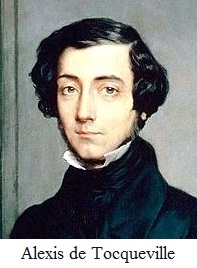In 2008, Times columnist Matthew Parris wrote a surprising piece entitled, “As an Atheist, I Truly Believe Africa Needs God.”[i] He built part of his case on first impressions:
Whenever we entered a territory worked by missionaries, we had to acknowledge that something changed in the faces of the people we passed and spoke to: something in their eyes, the way they approached you direct, man-to-man, without looking down or away.
I thought of Parris’s account when reading recently a series of reports written some 180 years earlier by a Frenchman visiting the United States, Alexis de Tocqueville. His hefty  book Democracy in America chronicled his impressions, which were basically favorable. He’d seen the fruit of the French Revolution, and now he was reflecting on the outcomes of the American Revolution. He didn’t give our budding nation a clean bill of health, for Andrew Jackson, famous for pushing the Cherokees on a Trail of Tears, was in the White House, and the Civil War that would end slavery was decades away. Furthermore, he was skeptical that the arts could rise to European levels, but he was impressed with the spirit of the people, a spirit he found to be informed by their faith. In his estimation, they had “brought to the New World a Christianity” he could not “depict better than to call it democratic and republican . . . From the beginning, politics and religion were in accord, and they have not ceased to be so since.”[ii]
book Democracy in America chronicled his impressions, which were basically favorable. He’d seen the fruit of the French Revolution, and now he was reflecting on the outcomes of the American Revolution. He didn’t give our budding nation a clean bill of health, for Andrew Jackson, famous for pushing the Cherokees on a Trail of Tears, was in the White House, and the Civil War that would end slavery was decades away. Furthermore, he was skeptical that the arts could rise to European levels, but he was impressed with the spirit of the people, a spirit he found to be informed by their faith. In his estimation, they had “brought to the New World a Christianity” he could not “depict better than to call it democratic and republican . . . From the beginning, politics and religion were in accord, and they have not ceased to be so since.”[ii]
He noted that “the sects in the United States are within the great Christian unity, and the morality of Christianity is everywhere the same.” He granted that there must be hypocrites and those who followed “their habits more than their convictions,” but concluded, “America is . . . still the place in the world where the Christian religion has most preserved genuine powers over souls; and nothing shows better how useful and natural to man it is in our day, since the country in which it exercises the greatest empire is at the same time the most enlightened and most free.” [iii]
He admired the separation of church and state, but insisted religion should “be considered as the first of their political institutions” for “it singularly facilitates their use of” freedom. He went on, “I do not know if all Americans have faith in their religion—for who can read to the bottom of hearts?—but I am sure they believe it necessary to the maintenance of republican institutions. This opinion does not belong only to one class of citizens or to one party, but to the entire nation; one finds it in all ranks.”[iv] Not surprising, for, in his view, it was “religion that gave birth to the Anglo-American societies: one must never forget this; in the United States religion is therefore intermingled with all national habits and all the sentiments to which a native country gives birth; that gives it a particular strength.”[v]
He went on to say that Islam could not support an America,[vi] and lamented the comparative loss of faith in his homeland: “I am ignorant of what one would have to do to give back the energy of youth to European Christianity, God alone could do it.”[vii] And while giving the predominating Protestantism its due, he was pleased to report, “America is the most democratic land on earth, and it is at the same time the county where, according to trustworthy reports, the Catholic religion is making most progress.”[viii]
Psalm 33:12a says, “Blessed is the nation whose God is the LORD,” and, arguably, Tocqueville saw this truth reflected in some measure in America. Of course, we must ask what he would see if he returned today, either to America or to his native Europe. What evidence would he find of Christian devotion and its concomitant blessedness? Were his investigations discouraging, we could at least join him in a hope for revival, all the while granting that “God alone could do it.”
————————————–
Endnotes
[i] Matthew Parris, “As an Atheist, I Truly Believe Africa Needs God,” Times, December 27, http://www.thetimes.co.uk/tto/opinion/columnists/matthewparris/article2044345.ece (accessed March 18, 2016).
[ii] Alexis de Tocqueville, Democracy in America, Translated, Edited, and with an Introduction by Harvey C. Mansfield and Delba Winthrop (Chicago: University of Chicago, 2000), 275.
[iii] Tocqueville, 278.
[iv] Tocqueville, 280.
[v] Tocqueville, 406.
[vi] Tocqueville, 419, 420.
[vii] Tocqueville, 288.
[viii] Tocqueville, 424.